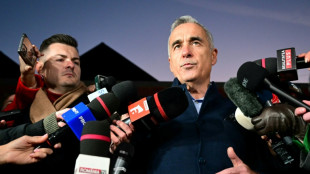
-
 Attack-minded Spurs boss Postecoglou says: 'You'll miss me when I'm gone'
Attack-minded Spurs boss Postecoglou says: 'You'll miss me when I'm gone'
-
Syria jihadists, allies shell major city Aleppo in shock offensive

-
 Macron inspects 'sublime' Notre Dame after reconstruction
Macron inspects 'sublime' Notre Dame after reconstruction
-
Arsenal must be near-perfect to catch Liverpool, says Arteta

-
 Arrests, intimidation stoke fear in Pakistan's politics
Arrests, intimidation stoke fear in Pakistan's politics
-
Showdown looms on plastic treaty days before deadline
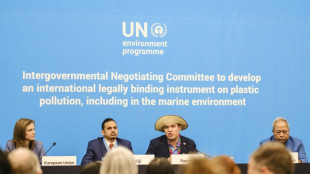
-
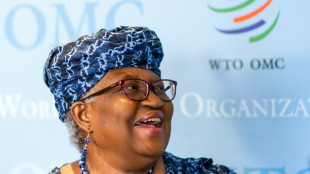 Ngozi Okonjo-Iweala: the WTO's trailblazing motivator
Ngozi Okonjo-Iweala: the WTO's trailblazing motivator
-
WTO chief reappointed as Trump threat looms

-
 US landmine offer to Ukraine throws treaty into 'crisis': campaign group
US landmine offer to Ukraine throws treaty into 'crisis': campaign group
-
British MPs debate contentious assisted dying law

-
 Macron offers first glimpse of post-fire Notre Dame
Macron offers first glimpse of post-fire Notre Dame
-
Syria jihadists, allies shell Aleppo in shock offensive

-
 Japan government approves $92 bn extra budget
Japan government approves $92 bn extra budget
-
Toll in Syria jihadist-army fighting rises to 242: monitor

-
 UK transport secretary quits in setback for Starmer
UK transport secretary quits in setback for Starmer
-
Days before deadline, plastic treaty draft highlights disagreement
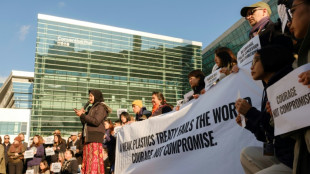
-
 Crypto boss eats banana art he bought for $6.2 million
Crypto boss eats banana art he bought for $6.2 million
-
Teen news boss criticises Australian social media ban

-
 Taiwan detects 41 Chinese military aircraft, ships ahead of Lai US stopover
Taiwan detects 41 Chinese military aircraft, ships ahead of Lai US stopover
-
Spain urged to 'build differently' after deadly floods

-
 WTO chief faces heavy task as Trump threat looms
WTO chief faces heavy task as Trump threat looms
-
Herbert takes control at Australian Open as Smith tanks

-
 Israel PM again warns Iran after top diplomat talks of revising nuclear doctrine
Israel PM again warns Iran after top diplomat talks of revising nuclear doctrine
-
Brilliant Brook's 132 puts England on top against sloppy New Zealand

-
 Brilliant Brook's 132 puts England on top against New Zealand
Brilliant Brook's 132 puts England on top against New Zealand
-
US landmine offer to Ukraine throws global treaty into 'crisis': campaign group

-
 Singapore hangs 4th person in three weeks
Singapore hangs 4th person in three weeks
-
Five things to know about NewJeans' shock split from agency

-
 Waste pickers battle for recognition at plastic treaty talks
Waste pickers battle for recognition at plastic treaty talks
-
Ireland votes in closely fought general election

-
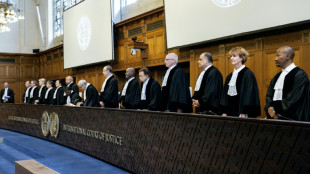 Top UN court to open unprecedented climate hearings
Top UN court to open unprecedented climate hearings
-
European countries that allow assisted dying

-
 British MPs to debate contentious assisted dying law
British MPs to debate contentious assisted dying law
-
Schmidt not expecting hero's welcome on Ireland return

-
 PSG stuck between domestic dominance and Champions League woes
PSG stuck between domestic dominance and Champions League woes
-
'Hot fight' as unbeaten Bayern visit Dortmund fortress

-
 Bordeaux-Begles' Samu 'not finished yet' with Wallabies
Bordeaux-Begles' Samu 'not finished yet' with Wallabies
-
Brook and Pope half-centuries haul England to 174-4 against NZ

-
 Yen rallies on rate hike bets as equity markets swing
Yen rallies on rate hike bets as equity markets swing
-
Ukraine superstar Mahuchikh brings 'good vibes' to her war-torn country

-
 PlayStation at 30: How Sony's grey box conquered gaming
PlayStation at 30: How Sony's grey box conquered gaming
-
Saudi Arabia hosts UN talks on drought, desertification

-
 PlayStation: Fun facts to know as Sony's console turns 30
PlayStation: Fun facts to know as Sony's console turns 30
-
Nepal's first transgender candidates run for local office

-
 Father of PlayStation says 'everyone told us we would fail'
Father of PlayStation says 'everyone told us we would fail'
-
Ireland seek to overcome former coach Schmidt's Wallabies

-
 Detroit survive Bears comeback to make it 10 wins in a row
Detroit survive Bears comeback to make it 10 wins in a row
-
Mexican actor Silvia Pinal dead at 93

-
 'Black Friday' deals target inflation-weary US consumers
'Black Friday' deals target inflation-weary US consumers
-
Liverpool look to deepen Man City crisis, Amorim seeks first Premier League win


Ukraine war fears give eastern Europe's populists new ammo
A year of war between Kyiv and Moscow has handed eastern European populists a potent weapon: fear.
With no end to the conflict in sight, some politicians are spreading disinformation that supporting Ukraine could drag their countries into the fight -- and many voters are listening.
False claims that governments plan to reinstate military service, announce general mobilisation or simply "send your sons to the meat grinder" have been dominating the political discourse from Prague to Sofia.
"Fear is a primal emotion, and politics of fear is the oldest tactic in the book," said Jiri Priban, professor of law at Cardiff University.
"It's part of every political campaign."
The scaremongering already appears to be working in Ukraine's westernmost neighbour, Slovakia, where large numbers of men filed an official refusal to fight for moral or religious reasons.
Whereas before the war Slovakia had some 1,500 professed conscientious objectors a year, their number rose to over 40,000 last year, according to the Slovak defence ministry.
At least some of this panic among young Slovak men of military age has been provoked by former Prime Minister Robert Fico, who is running an election campaign based on criticism of NATO, the US and "Ukrainian fascists".
Fico has been telling voters that the conflict "does not concern us" because it is a "war between the US and Russia".
Parroting pro-Kremlin propaganda, he has called the EU's support of Ukraine a "suicidal mission" and accused the current government of Slovakia, a NATO member, of being a lackey of the US who would not hesitate to "send our boys to the front".
- 'Effort to scare people' -
So far, the scare tactic seems to have worked: Fico's party Smer is currently polling first or second ahead of parliamentary elections in September.
"Slovakia is extremely vulnerable to disinformation and the Russians have found a hugely fertile ground for their propaganda here," said Aspen Institute fellow Michal Vasecka, who teaches sociology at the Bratislava International School of Liberal Arts.
"When you keep telling people that their government is an agent of the US, they start thinking 'why should our boys fight for US interests?'"
False claims about the war also dominated the recent presidential election in the neighbouring Czech Republic and continue to plague the new president Petr Pavel.
Although the retired NATO general ultimately won the election on January 28, he remains a target of a toxic disinformation campaign portraying him as a trigger-happy war hawk.
AFP fact checkers debunked false claims that Pavel called for sending Czech soldiers to fight in Ukraine, that he wanted the Czech Republic to declare war on Russia, or that he supported mandatory military training for people born after 2003.
Pavel's election rival, former prime minister Andrej Babis, ran billboards claiming that his opponent "does not believe in peace" and promised that "I will not drag the Czech Republic into war".
Many social media posts and chain mails, fact-checked by AFP, also falsely claimed that Pavel was planning a general mobilisation.
"There is an ever-stronger effort to scare people into thinking they will have to fight in the war, a war they cannot win," Czech Elves, a volunteer organisation tracking and analysing disinformation, wrote in their latest monthly report on false narratives.
"Russia is being portrayed as an unbeatable nuclear superpower that is waging a successful military campaign in Ukraine," the report said.
- 'Existential fear' in Baltics -
Frightening citizens with war has become common in other parts of eastern Europe.
In Bulgaria, the pro-Russian, ultra-nationalist Vazrazhdane party has been organising anti-government protests and warning voters against becoming "cannon fodder".
Hungarian Prime Minister Victor Orban has likened Ukraine to Afghanistan and his government openly sides with Russia.
Paradoxically, the politics of fear of war gains very little traction with voters in Poland and the Baltic republics -- the countries where the danger of potential Russian military aggression is the most real.
The common negative historical experience with Russia has immunised their populations against pro-Kremlin propaganda, according to Priban.
"There is real existential fear in the Baltics, but it makes their support of Ukraine even stronger," said the Cardiff University professor.
M.Ouellet--BTB


